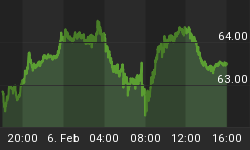Draghi's celebrated, chest-thumping, "whatever it takes" to preserve the Euro was apparently...nothing. The ECB did nothing. Perhaps he meant the value of the Euro, not its existence, and they would preserve it like the Bundesbank wants to, by controlling its supply? Yet, in his press conference he seemed to make clear that he meant the ECB would go to bat for European union, as he said the "Euro is irreversible."
Actually, Mario, that's precisely the question at hand!
Also, like a true central planner, he intoned that "high yields [for peripheral countries] are unacceptable." At least, I assume he means for the peripheral countries, although it was not so long ago that 7% was considered a sustainable yield. At some level of debt, I suppose that even 2% is unsustainable! But this isn't the point. The point is that it isn't up to Draghi to "accept" high yields. It isn't his market to arrange. The market itself makes the decision about what yields are "acceptable," given the risk. I think he means the same thing my daughter means when she stamps her 5-year-old foot and declares something "unacceptable." What she means is, she doesn't like it. Just like with her, the answer to Draghi is "too bad."
The Fed's inaction was surprising (to me), but justifiable with the ECB up the following day. The inaction of the ECB is much harder to fathom in the context of President Draghi's boast of only a few days past. A lot of theories about future paths of policy have now been thrown somewhat into question, for the ECB appears to have been Bundespanked.
Are monetary policymakers maybe finally growing concerned about money? They haven't been for a long time; Daniel Thornton, a senior economist at the St. Louis Fed, has been fairly in the wilderness with his publications exhorting economists to actually look at the data again. His latest piece, "Monetary Policy: Why Money Matters and Interest Rates Don't", likely will get no more read inside the Fed than his other pieces have, more's the pity.
Now Draghi did say in the Q&A part of his press conference that we shouldn't assume the ECB "will or will not sterilize" any bond purchases that happen. Since always previously the ECB has claimed it was sterilizing purchases (which means they soaked up the money that they were inserting with the purchases), this would represent a weakening of hard-money resolve...if it were actually going to happen. I rather wonder if he didn't say that just to tweak the Bundesbank. Anyway, he says that "details [are] to come in the next weeks," which was enough to save markets from a pure meltdown.
Strangely, the Euro weakened along with stock markets in the U.S. (S&P -0.7%) and in Europe (Eurostoxx -3.0%). The Euro ought to be strengthening if investors thought that the ECB just got monetary policy religion and so would restrict the money-printing activities everyone was assuming would happen. Unless, that is, investors are selling Euro-denominated issues because they think the union will break up due to ECB inaction.
My head hurts.
What seems clear enough is that for at least a month or two, the markets are on their own. I don't know how that's going to work, when Greece is due to borrow money from the ECB to pay off maturing bonds in only 3 weeks. Conventional wisdom is that the ECB will advance the money, since the ECB holds most of the debt that will be paid off, but I'm no longer so sure of anything.
I do know that we have Payrolls tomorrow morning, and expectations are justifiably low. Consensus expectations are for 100k in nonfarm payrolls and an unchanged 8.2% Unemployment Rate. Payrolls over the last three months have been, after revisions, 68k, 77k, and 80k respectively. The market likely reacts to a very weak number in a positive way, because the conventional wisdom seems to be that the Fed will surely ease at the next meeting if the data remains this weak. But what do we do with a strong number that throws the Fed's immediate next move into doubt? My guess is that something in the high 100s (175k, 190k, etc) is taken as bearish equities, bullish bonds for this reason, while much above that it all becomes confusing because it won't be clear whether the first three months of the year were the aberration (the operating hypothesis) or the last three months were.
The only clear investment to me remains commodities, which corrected strongly today , down around 1.25-1.50% ex Nat Gas, which plummeted nearly 8%. Gasoline, however, rallied another three cents. If the central banks abruptly started to control money supply growth and shrink central bank balance sheets - a prospect that I give about a 20% chance to - then the future returns to commodities would be less than I expect. But they're still undervalued with respect to the current money supply, so even in this case I'd expect solidly positive 5-year real returns.
And if the Bundespanking wears off (and as a father I can tell you, they tend to wear off very quickly), the near-term returns to commodities will continue to look great as well.















